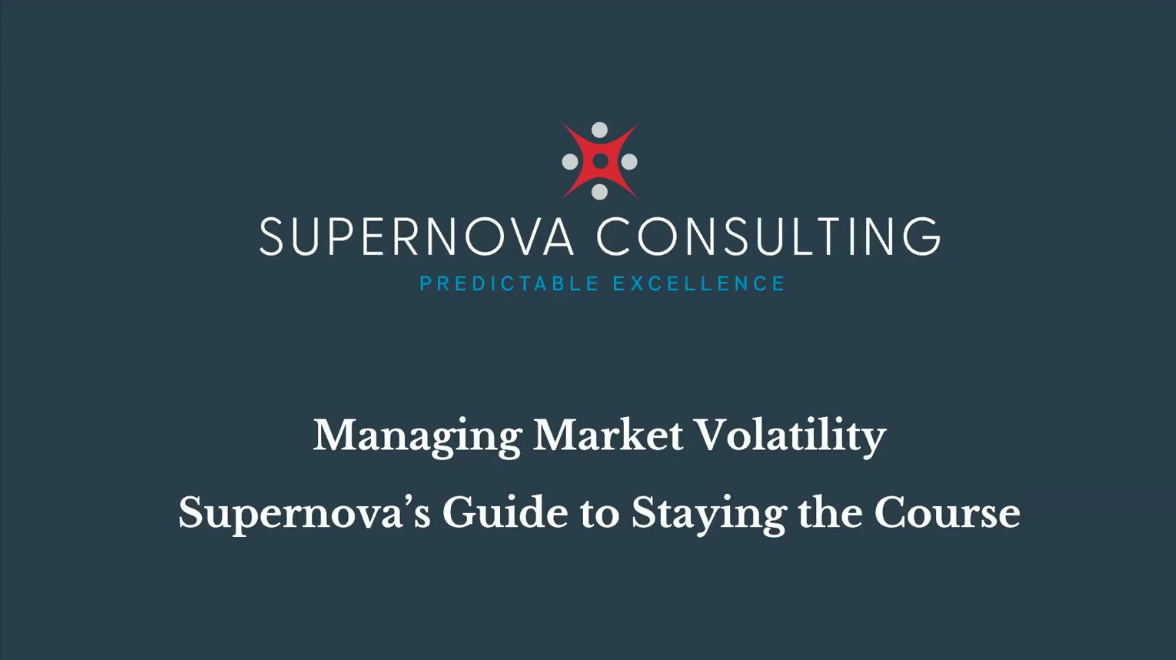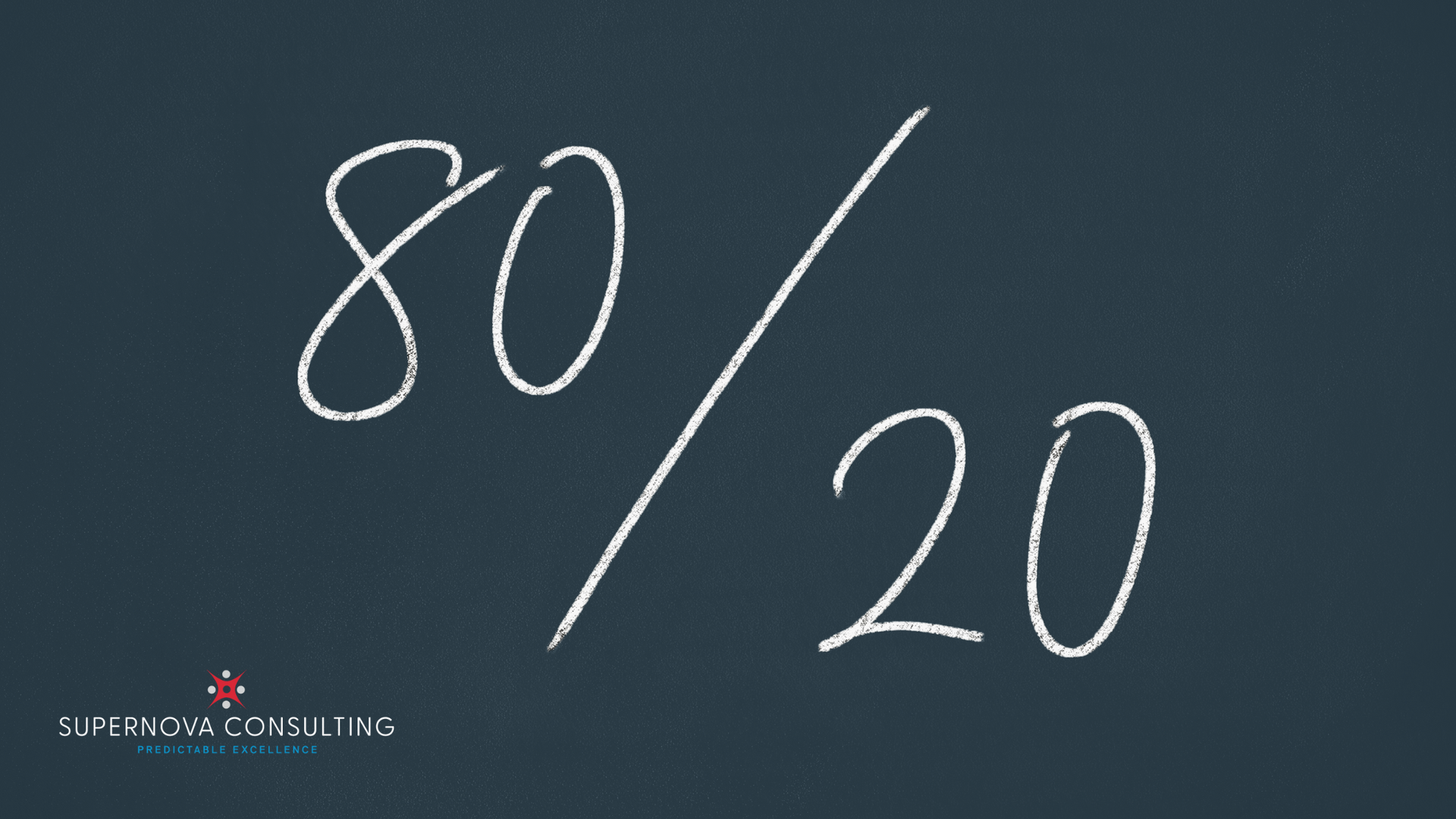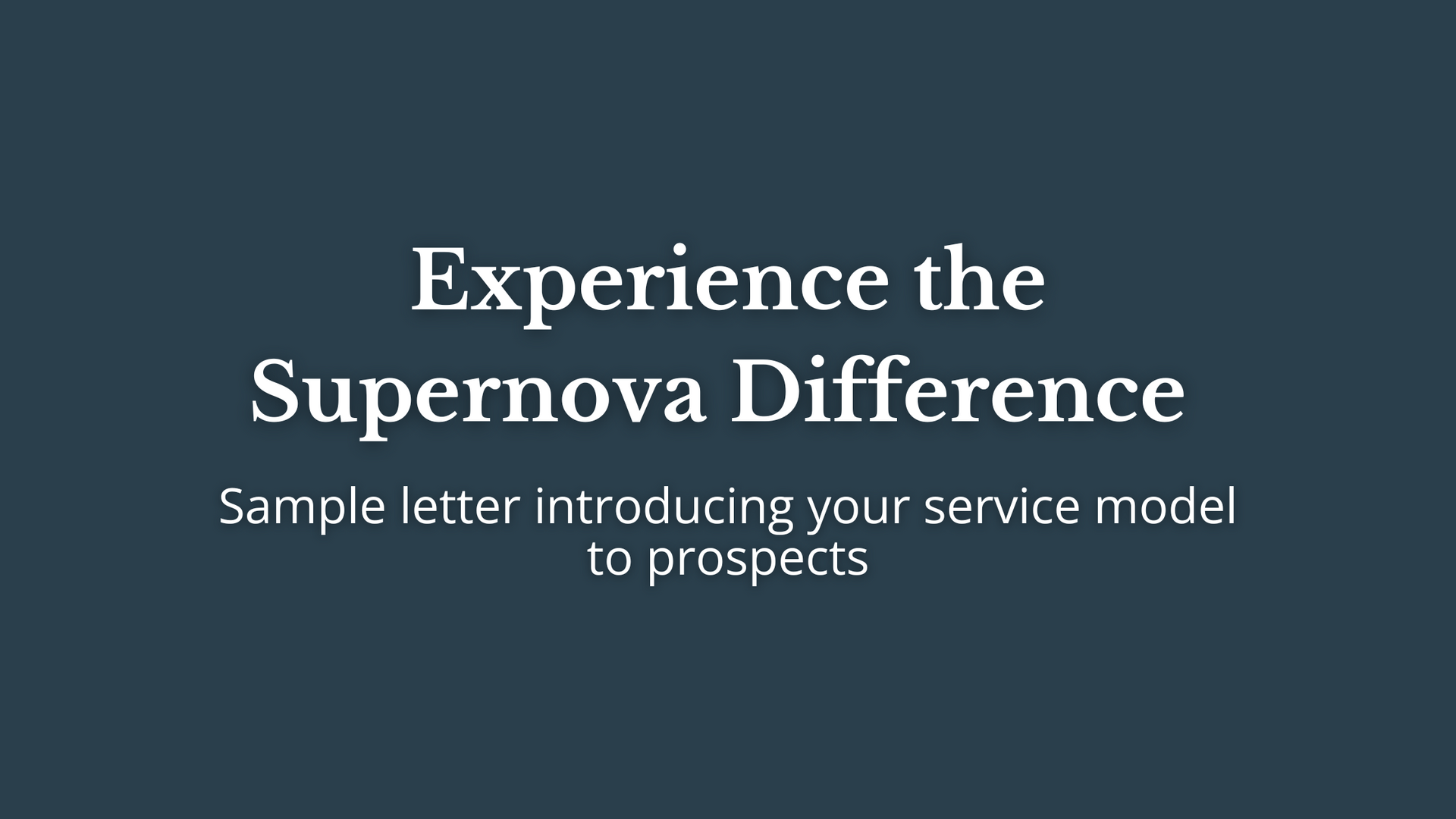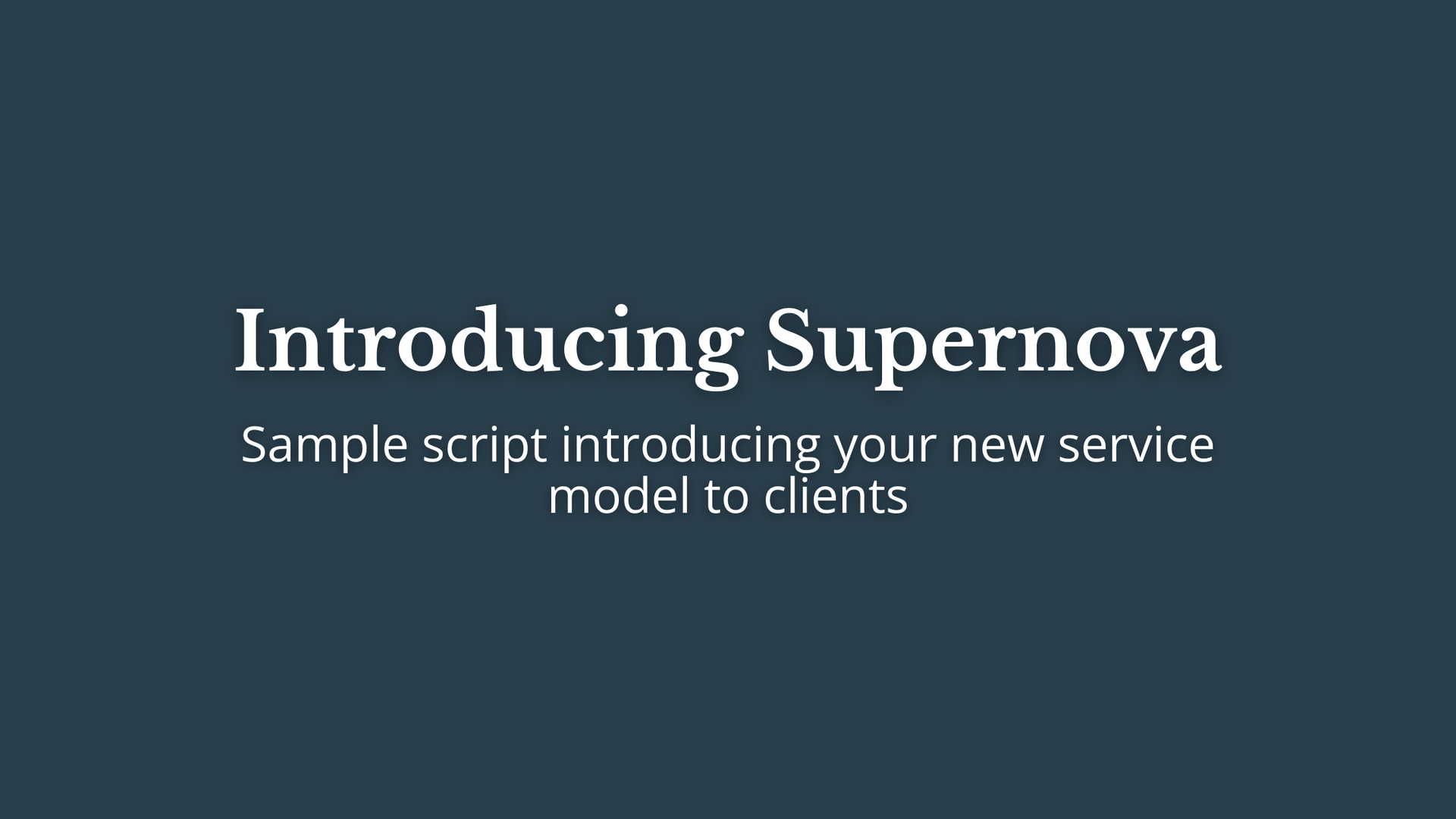Content Library

Feeling stuck or ready for your next breakthrough? Our latest blog explores how mastermind groups can help financial advisors gain clarity, stay accountable, and grow with the support of trusted peers. At Supernova, we're launching cross-firm groups this July—designed to connect advisors who want real conversations and real results.

On April 9, 2025, Supernova Consulting hosted a live webinar: Managing Market Volatility – Supernova’s Guide to Staying the Course. This session offered actionable strategies for navigating today’s unpredictable markets while keeping clients focused on their long-term goals. From intentional planning to high-impact communication, our expert panel shared how the Supernova process provides a structured framework to help advisors lead with clarity, confidence, and calm.

In this March 2020 webinar, Supernova Consulting Group president Rob Knapp addresses financial advisors during a period of market volatility, sharing strategies for maintaining professional effectiveness and client relationships. He emphasizes Supernova's core principles, particularly the "12-4-2" client contact approach as a baseline for communication, while suggesting even more frequent contact during volatile periods. Throughout the presentation, he stresses the need for financial advisors to stay informed with accurate facts, maintain emotional intelligence, practice servant leadership, and take care of their own well-being through proper sleep, diet, and exercise to maintain an "ideal performance state" that enables them to better serve their clients during challenging market conditions.

Your relationship with clients extends far beyond portfolio management and financial guidance. At Supernova Consulting, we understand that true advisory leadership means becoming a trusted partner in your clients' lives, not just their finances. However, this trust must be earned through intentional relationship building and a commitment to service excellence. Consider this fundamental question: How deeply do you understand your clients' relationship with money? While you may have gathered the essential data – employment, income, family structure, and estate planning documents – this information alone doesn't reveal how they'll interact with their wealth over time. At Supernova, we believe that balancing technical expertise with emotional intelligence is crucial for growth in your practice. The most successful advisors understand that client relationships should mirror the depth of understanding found in close personal connections. Through our coaching program, we help advisors develop a service model that uncovers these crucial insights through thoughtful questioning: "What is your proudest achievement?" "Is it important to talk about money as a family?" "What are you grateful for?" "What was the most important thing someone taught you about money?" "What life experience has strengthened you the most?" These questions help establish the foundation for comprehensive planning that aligns with Supernova's core principles. However, interpreting clients' responses and integrating them into your practice requires skilled leadership and guidance. Our coaching program equips advisors with the tools to elevate their practice while maintaining focus on what matters most – building lasting client relationships built on trust and understanding. Reflection Questions for Advisors: How well do you know your closest clients beyond their financial data? How does your current knowledge of clients inform your planning approach? What unique questions could you ask each of your top clients to deepen your understanding of their needs and goals? Take the next step in your professional development by partnering with Supernova Consulting. Our proven approach helps advisors achieve excellence across all dimensions of their practice while maintaining the balance needed for sustainable success.

Not doing something will always be faster than doing it. In software development, engineers often remind each other that "there is no code faster than no code" - a principle that perfectly aligns with Supernova's approach to process optimization. Just as we advise advisors to eliminate or streamline activities as part of the optimizationin their practice, this philosophy extends beyond programming into every aspect of business and life. Consider meetings - no meeting goes faster than not having a meeting at all. This mirrors Supernova's emphasis on efficient and effective operations and strategic time management. While meetings are sometimes essential, we often agree to participate in gatherings that could be handled through other means or eliminated entirely. The Challenge of Yes We frequently respond with "sure thing" to requests, only to find ourselves overwhelmed days later by mounting commitments. At Supernova, we've observed this pattern across organizations of all sizes - teams become frustrated by the number of clients and obligations they voluntarily accepted. This reflects a fundamental misalignment between immediate social pressure and long-term productivity goals. The Social Complex Our tendency to agree stems from wanting to be helpful and collaborative. This is especially true in professional relationships where we anticipate future interactions - colleagues, clients, and partners. Much like Supernova's relationship-centric consulting approach, maintaining strong professional connections is vital. However, this shouldn't come at the expense of effective time management. Yes vs. No: A Matter of Magnitude While "yes" and "no" appear to be simple opposites, they carry vastly different weights in terms of commitment. This understanding forms a cornerstone of Supernova's decision-making framework. When you decline one option, you're simply saying no to that specific opportunity. However, when you accept, you're effectively saying no to every other possible use of that time. As economist Tim Harford explains, "Every time we say yes to a request, we are also saying no to anything else we might accomplish with the time." The Power of Strategic Decline Saying no isn't merely a luxury of the powerful - it's a strategy for becoming successful. Steve Jobs famously said, "People think focus means saying yes to the thing you've got to focus on. But that's not what it means at all. It means saying no to the hundred other good ideas that there are. You have to pick carefully." This approach directly mirrors Supernova's concepts of the "Maximum # of Clients" and "Minimum Assets or Revenue per Client". Following these two simple but challenging rules set the stage for consistent and long term growth of a business. Evolution of No / Practical Application As your career progresses, this strategy must continue to evolve. The opportunity cost of time increases with success - a principle Supernova emphasizes when coaching Advisors to review and update their "Max & Min" on at least an annual basis. As your career continues to advance, you must learn to decline even good client opportunities to make room for excellent ones. Prevention Over Optimization More energy is wasted on unnecessary tasks than on inefficient execution of important ones. As Peter Drucker wisely observed, "There is nothing so useless as doing efficiently that which should not be done at all." In essence, the power of no lies not in universal rejection, but in strategic declination. It's about creating space for what truly matters - a fundamental principle that drives Supernova's core concepts of Balance, Service and Growth.

Let's be honest – if you're managing $100M+ in AUM, you're probably great at taking care of your clients but struggling to find time for everything else. I've been there. Rushing from client meetings to your kid's soccer game, answering emails during family dinner, and wondering if there's a better way. There is. After three decades of working with successful advisors like you, we've discovered five critical steps to reclaim your time while growing your practice. Step 1: Stop Being Everyone's Financial Advisor: You read that right. The path to growth isn't taking on every client who comes your way. It's about serving fewer clients exceptionally well. Consider this: would you rather have 300 clients with average service or 100 clients who receive concierge-level attention? Our most successful advisors limit their practice to 100 core relationships, allowing them to provide premium service while actually working less. Step 2: Transform Your Calendar from Chaos to Control: Remember when you could predict your day? Neither do most advisors. But imagine having structured client contact through a proven 12-4-2 system: 12 monthly contacts, 4 quarterly reviews, and 2 in-person meetings annually. Per client. No more random calls or emergency meetings. Just purposeful, planned interactions that both you and your clients can count on. Step 3: Empower Your Team Through Structure: Your practice manager should be running your calendar, not the other way around. We've developed a system where your team handles 80% of the day-to-day operations, freeing you to focus on high-value activities and yes, actually leaving the office at a reasonable hour. Step 4: Create Growth Without Sacrificing Time: "But how do I grow if I'm seeing fewer clients?" Through intentional, systematic business development. Our advisors typically double their AUM within 24 months using our proven acquisition strategies – all while working fewer hours. Step 5: Become a Corporate Athlete: Success isn't about working longer hours; it's about being at your best during your working hours. We'll show you how to structure your day for peak performance, including proper recovery time for both you and your team. Here's What Actually Changes: Your calendar becomes predictable Your team becomes more engaged Your clients get better service Your growth becomes systematic Your family gets you back The best part? This isn't theoretical. This framework has been tested and refined by advisors just like you for almost three decades. It works because it was built in the real world, by real advisors who refused to accept that success required sacrifice. Think it sounds too good to be true? That's exactly what most advisors say – until they see it in action. Here's the thing: your practice should serve your life, not consume it. Your success should strengthen your relationships, not strain them. Ready to discover how? Schedule a free 30-minute consultation to learn how these principles can transform both your practice and your life. Because exceptional client service shouldn't require sacrificing what matters most. Remember: The best time to transform your practice was years ago. The second-best time is now.

How do you explain to clients that you’re shifting to fewer clients for higher-level service? Start with honesty and a clear plan. By reassessing your practice, you’ve chosen to prioritize exceptional service—multi-generational planning, full implementation, and rapid problem resolution—delivered through a structured twelve-appointment process. This strategy ensures every client gets the attention they deserve. In this post, we’ll share how to communicate this transition, reassure top clients, and thoughtfully refer others, turning a tough conversation into a testament to your commitment to excellence.
Category
Content Type










